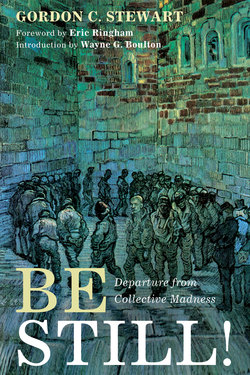Читать книгу Be Still! - Gordon C. Stewart - Страница 18
Say the Word ‘Freedom’
ОглавлениеI may not be able to say all I think, but I am not going to say anything I do not think.And I would rather a thousand times be a free soul in jail than a sycophant or coward on the streets.
—Eugene V. Debs20
My hearing continues to get worse. In the soundproof booth of the hearing test, the audiologist asks me to repeat the words I hear . . .
“Say the word ‘good.’”
“Wood.”
“Say the word ‘cold.’”
“Hold.”
“Say the word ‘gold.’”
“Goal.”
It’s not easy inheriting my mother’s hearing loss. Getting the words wrong often separates me from normal conversation. But it also has its advantages. I listen more carefully, and the world of silence brings me to a deeper reflection about the words we hear every day.
I’ve begun to listen more carefully when the word “freedom” is used.
“Say the word ‘free.’”
“Free,” we say. And something deep within us hears the national anthem: “land of the free, and the home of the brave.”
We Americans love freedom.
Future anthropologists will likely observe that freedom was the most treasured word in the American vocabulary. It is the most powerful word in our language.
No one understands this better than the handlers of political candidates. They know that the word evokes an unspoken reverence and that perceived threats to freedom alarm us and cause us to get back in the ranks of freedom’s faithful. They know the nature of language and of word association.
“Say the word ‘freedom,’” they say.
“Democracy.”
“Say the word ‘regulation.’”
“Socialist.”
“Say the word ‘socialist.’”
“Un-American.”
“Say the word ‘government.’”
“Enemy.”
“Say the word ‘American.’”
“Free.”
Freedom stands alone in the American pantheon.
Ironically, in the hands of the unscrupulous, the word we associate with individual liberty can cause a collective stampede. It calls us from grazing freely in the pasture to joining a mindless herd.
We don’t like heresy; we’re afraid of being heretics like Eugene Debs, convicted of sedition in 1918 for exercising his constitutional right to freedom in a speech at Canton, Ohio. Sentenced to ten years in federal prison, he exercised his right to make one final plea to the court.
“Years ago,” he said, “I recognized my kinship with all living things, and I made up my mind that I was not one bit better than the meanest of the earth. I said then, and I say now, that while there is a lower class, I am in it; while there is a criminal element, I am of it; while there is a soul in prison, I am not free.”21
My hearing will continue to get worse. It will take me into a world of increasing silence. In a way, I wish the same for the rest of my countrymen. We could all use some time away from the word-association games.
20. Debs, “Statement to the Federal Court.” Eugene V. Debs (1855–1926) delivered a Canton, Ohio, speech to the Ohio State Convention of the Socialist Party in opposition to American participation in World War I. He was convicted of treason and sentenced to ten years in federal prison. Debs was a founding member of the American Railway Union (ARU), which was famous for the Pullman Strike. President Warren G. Harding commuted his sentence in December 1921.
21. See Debs, “Statement to the Federal Court of Cleveland, Ohio” on September 18, 1918, after being convicted of violating the Sedition Act.
